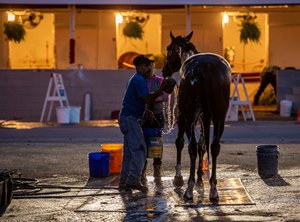Senate Bill May Bring Needed Change to Industry


A bill sponsored by Colorado Sen. Michael Bennet, if passed, could drastically alter the Thoroughbred racing landscape.
The Affordable and Secure Food Act, which has undergone numerous versions, had recently been revised to include language benefitting the industry.
The key elements include providing equine workers a pathway to citizenship, making workers eligible for H-2A visas rather than H-2B visas, and establishing a wage structure that will help farm owners keep the costs of running their operations from getting out of control.
A spokeswoman for Bennet's office confirmed the inclusion of equine workers in the bill.
The hope is the bill will be attached to the omnibus spending bill, which is expected to be released Dec. 19 and voted on Dec. 23.
Most typical agricultural operations already receive the benefits this bill would provide the Thoroughbred industry. Many of the challenges faced in the Thoroughbred sector are no different from those confronted on other types of farms.
This would be the first time equine workers would be included in such a bill involving H-2A visas. Such inclusion came as a surprise for some in the industry.
The Kentucky Thoroughbred Association and Kentucky Thoroughbred Owners and Breeders executive director Chauncey Morris said his organization has been involved in some of the conversations around the legislation.
"It's really been awesome to see the Biden administration, and especially (U.S. secretary of agriculture Thomas) Vilsack show some leadership on this," he said. "But as far as chances of passing, I can't really prognosticate on that. I know that as far as the Thoroughbred breeding and racing industry is concerned here in Kentucky, we needed this 15 years ago. I think the country needed this, frankly, 15 years ago as well."
Currently, equine workers are eligible for H-2B visas, which are for seasonal non-agricultural workers. That program has a cap on the number of participants, but with a change to H-2A there would be no cap and make it easier to fill many vital roles on farms and at tracks.
For undocumented workers to gain United States citizenship under the Certified Agricultural Worker status, they first must work in the industry for two years to be eligible to apply for citizenship. They must complete 10 years total in the industry and then another four after that under provisional legal status. This is meant as a deterrent for anyone who works the 10 years and then stops. The spouse and minor children of the worker are also covered by this change.
There are also provisions to prevent frivolous lawsuits including mediation measures.
Concerns that rising wages would cause many family-run farms and ranches to go under is also addressed in the bill. The bill aims to provide fair wages for the workers but gives farms more cost certainty via wage structure and three-year surveys examining the conditions affecting agricultural workers.
This bill version was drafted on Dec. 15, but several industry leaders reached out because they saw the need for inclusion. They took part in conversations with Bennet's staff Dec. 17 with the bill being redrafted and final language distributed Sunday.
"If the bill passes, it's going to be transformational to not only the Thoroughbred industry—breeding and racing—but to the farm economy and to many other economic sectors across the country that rely on foreign labor," said Morris.
Important in passing this bill is the support of Kentucky Sen. Mitch McConnell. A call to his Washington D.C. office was not answered and one to his Lexington office not returned.
